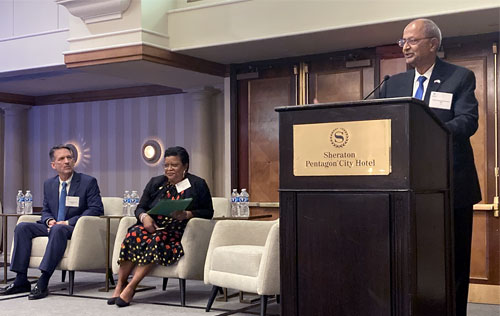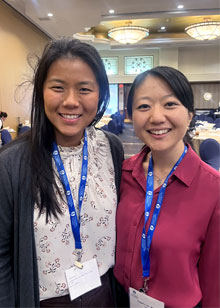More than 150 APA members, including 55 resident-fellow trainees—21 of whom are leadership fellows sponsored for the conference by the American Psychiatric Association Foundation (APAF)—joined APA and District Branch leaders for the 2024 State Advocacy Conference this past weekend.
The conference featured educational panels on a wide range of state-level advocacy issues, including trends in psychologist prescribing, efforts at the state level to increase residency positions, state successes in getting Medicaid payment for collaborative care, trends in state initiatives on psilocybin, and federal and state trends in parity enforcement. The conference also featured educational sessions on the importance of storytelling in advocacy, understanding social media, and how to be a “constant advocate.”
Legislative Priorities
“Advocacy is at the core of the value APA and our District Branches provide to members,” said APA President Ramaswamy Viswanathan, M.D., Dr.Med.Sc., during opening remarks. “Both federal and state advocacy are important.
“With the 2024 election right around the corner and new state legislative sessions gearing up to start in January, this is an especially important time for us to come together to discuss the importance of our state legislative priorities,” Viswanathan said. “Some of the issues before us are weighty and important: ending insurance discrimination against mental illness; scope of practice; improving access to care; enhancing the psychiatric workforce; and improving health equity.
“We need your commitment, not just today and tomorrow, but in the days that follow, to build relationships with your state legislators, and advocate for these issues.”
APA CEO and Medical Director Marketa Wills, M.D., M.B.A., reminded attendees that the
APA PAC is what powers the association’s advocacy efforts at all levels. “Advocacy takes a concerted effort at the federal and state level,” Wills said. “It’s our PAC that gets us in the door.”
She also noted the vital importance of advocacy with federal regulatory agencies that write the rules implementing legislation. “Advocacy is not always about legislative fixes, but also about a regulatory fix,” Wills said, adding that APA has an “incredibly dense network” of contacts in those agencies.
“It’s important also that we band together with other colleagues in the house of medicine and with partners in the broader mental health community,” Wills said, “including patient and family groups.”
Leadership Fellows in Attendance
The next generation of psychiatrists were also an essential part of the mix at the conference, with 21 APA-APAF Leadership Fellows in attendance.
“Supporting trainees at the state advocacy conference was a no-brainer,” said Rawle Andrews Jr., Esq., executive director of APAF. “The mental health crisis continues to grow, and APAF must help the field of psychiatry by expanding the capacity of our future leaders in psychiatry to work more efficiently and effectively in all phases of medical practice, including science, public policy, and community education and outreach.”
Two of the fellows were Katherine Wu, M.D., PGY-4 resident at the University of Virginia Adult Psychiatry program, and Angela Liu, M.D., PGY-3 resident with Northwell Health at Zucker Hillside Hospital.
“I think it’s important to listen and learn from the thought leaders about these advocacy issues and think about what information or talking points or narrative styles I can bring back to use in advocacy with my own state representatives,” Wu told Psychiatric News.
She especially appreciated education about psychologist prescribing in states where it has expanded. “I really like how that issue was broken down based on how far the issue has progressed in various states,” Wu said.
Liu said the practice of psychiatry has heightened her awareness of the social determinants of mental health, which in many cases can only be addressed at a system or policymaking level. “Something I am really passionate about is incorporating more advocacy-skills-based education in our training,” she said. “I think it’s crucial to being an effective advocate for our patients.”
Liu added: “I really appreciated the storytelling session. As psychiatrists we connect with our patients through their stories and their narratives—that is one of the strong suits of our field. I want to see how we can harness that storytelling as a part of advocacy to make policy changes.”
Advocating for Constant Advocacy
The conference was moderated throughout by Lee Tynes, M.D., chair of APA’s Council on Government Relations, who chaired a panel on “the constant advocate.”
“Advocates within the organization really become the voice for our patients at the policymaking level,” Tynes told Psychiatric News. “Along with patient and family advocacy groups, the involvement of professional advocates is vitally important.”
He hailed the role of trainees at the conference, and noted that in past years, little attention was paid to training professionals in the skills needed to be an effective advocate. Today, he said, Yale and the National Children’s Hospital are among the institutions that “are building organized programs for residents and fellows to learn these unique skills at an early stage in their professional career.” ■


